Weddings are expensive, we all know that. But even the most carefully planned budget can get thrown off by the little things you didn’t see coming. These hidden costs have a way of sneaking up, adding hundreds (or even thousands) to your total spend.
Some are small expenses that add up, while others are major fees that couples simply don’t realize they need to account for.
The good news? Most of these surprise costs can be avoided (or at least softened) with a little planning.
Whether it’s overlooked venue fees, last-minute vendor add-ons, or extra costs tied to stationery and decor, knowing what to expect ahead of time will help keep your wedding budget on track.
Let’s go over some of the most common hidden wedding costs and how to prepare for them.
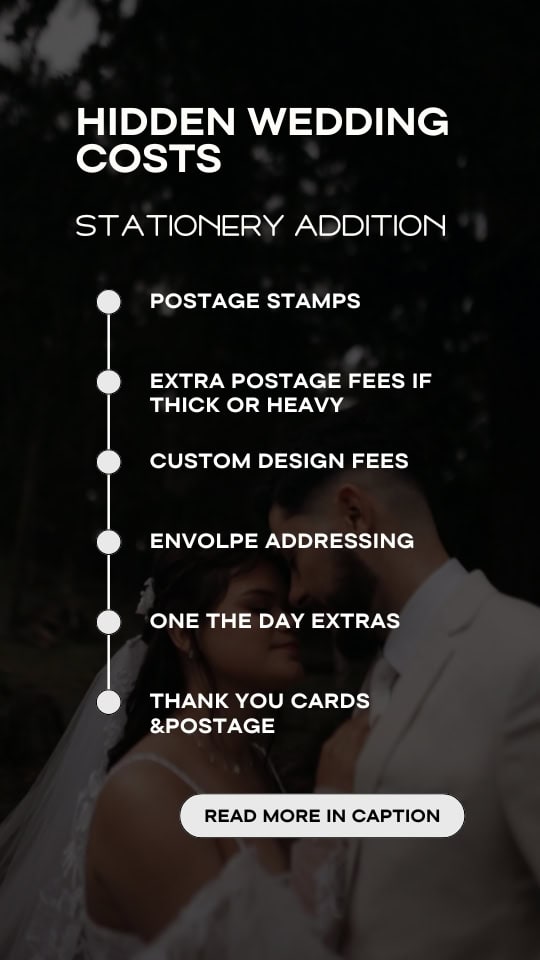
Stationery HIDDEN COSTS
1. Postage stamps
I’m always surprised by how many couples forget to budget for postage stamps. They often spend their entire invitation budget or even go over without thinking about mailing costs. If you’re sending a large number of invites, consider postcards (saving on envelope costs), or mix digital and physical invitations to balance out these expenses.
2. Additional postage
Extra postage is required if your invitations are particularly large, heavy, or uniquely shaped. It’s a small cost per invite but adds up quickly across your guest list. To reduce these costs, consider simpler, lighter invitations, or use a wedding website for detailed info to minimize printed inserts.
3. Custom design fees
Custom designs look amazing, especially if you want special elements like an illustration of your venue or a personalized monogram. These bespoke details, however, usually incur one-off design fees which can range from hundreds to thousands. If you love personalized elements, semi-custom designs from platforms like Etsy or Zazzle allow you to add a personal touch without breaking your budget.
4. Envelope liners, wax seals, and special closures
Envelope liners, wax seals, and special closures elevate invitations beautifully, but these details add significant extra costs per invite. To save money without sacrificing style, consider DIYing wax seals or opting for printed envelope designs or stickers instead.
5. Calligraphy or hand-addressing services
Professional calligraphy or hand-addressing your invitations can significantly raise stationery costs. If you want the elegant look without the high price, printing addresses at home using beautiful fonts, or using affordable address labels can help you achieve the same impact for less.
6. Additional stationery (place cards, seating charts, menus)
Additional paper details like place cards, seating charts, and menus are often forgotten but can quickly add up. Creating these yourself or using printable templates is a practical way to maintain your budget while keeping a cohesive look.
7. Thank you notes and postage
Thank you notes and the postage to send them out post-wedding is an expense many couples overlook initially. To help manage costs, choose simpler designs or postcards. Another creative idea is to time your wedding so that thank-you notes can double as holiday greetings if they’re sent around the same period.
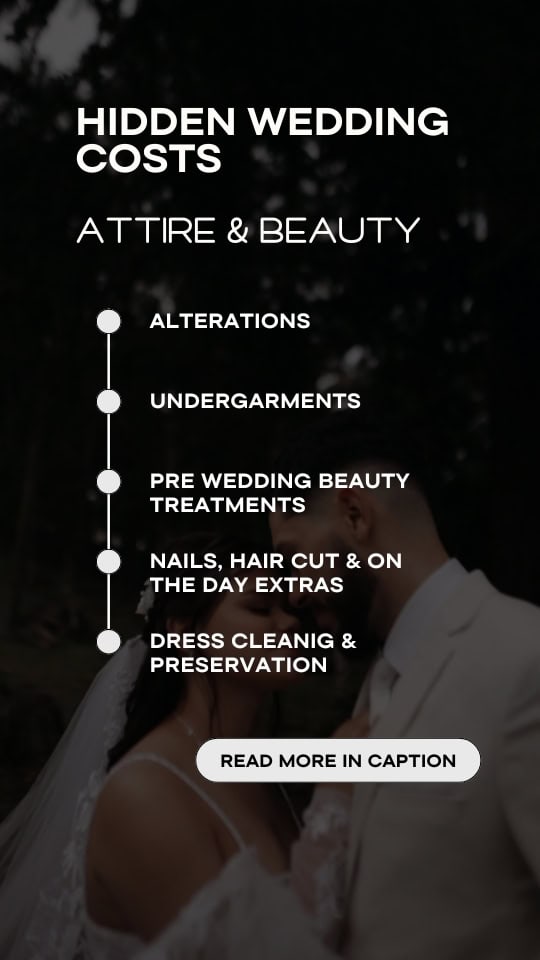
Attire & Beauty HIDDEN COSTS
8. Wedding dress alterations
Most wedding dresses need some level of alteration, whether it’s adjusting the hem, taking in the bodice, or adding bustling for movement. These costs vary widely depending on the complexity of the dress. If you’re shopping for a gown, leave room in your budget for alterations—you don’t want a perfect dress that doesn’t fit perfectly.
9. Undergarments and accessories
Many brides forget to factor in the cost of the right undergarments, shoes, jewelry, and even a veil. These seemingly small expenses can add up fast. If you’re trying to save, consider borrowing accessories or shopping sales for shoes and jewelry.
10. Pre-wedding beauty treatments
Facials, spray tans, lash extensions, teeth whitening—there are plenty of pre-wedding beauty treatments that couples opt for, but they’re often forgotten in the budget. If you’re planning on any of these, book early and look for package deals.
11. Additional stylists for wedding party members
Most couples budget for their own hair and makeup, but what about the wedding party? If you want everyone to have professional styling, you may need to hire additional stylists, which can increase costs significantly. Consider having just the bridal party styled professionally and letting others do their own.
12. Pre-wedding attire
Engagement party dresses, bridal shower outfits, rehearsal dinner looks—wedding-related events require multiple outfits, and they can get pricey. To save, try reusing accessories or mixing and matching pieces to create fresh looks without buying all new outfits.
13. Dress cleaning and preservation
After the wedding, many brides want to clean and preserve their dress, especially if they plan to keep it as a memento. Professional cleaning and preservation can cost hundreds, so it’s worth looking into options before the big day to compare prices and find the best deal.

Legal Details
14. Marriage license fees
It’s a small but necessary cost, but fees can vary widely depending on your location. Some places charge more than you’d expect, and there may be additional fees if you need expedited processing or extra certified copies. If you’re having a destination wedding or getting legally married before your ceremony, make sure to research the costs ahead of time.
15. Marriage officiant fees
Even if you have a friend or family member officiating, they may need to become legally ordained, which can come with a fee. Professional officiants typically charge anywhere from $100 to $500, depending on their experience and the complexity of your ceremony. Some also require travel fees if your venue is outside their usual area.
16. Copies of marriage certificates
You’ll need multiple copies of your marriage certificate for name changes, updating bank accounts, and handling legal paperwork. Ordering them upfront can save you from extra fees later. Some states or countries charge per copy, and expedited processing costs more if you need it quickly.
17. Passport updates and name change fees
If you’re changing your last name, updating your passport and other official documents can add up. A passport name change isn’t free, and if you need it rushed for a honeymoon, expect to pay extra. Driver’s licenses, bank accounts, and social security updates may also come with minor administrative costs.
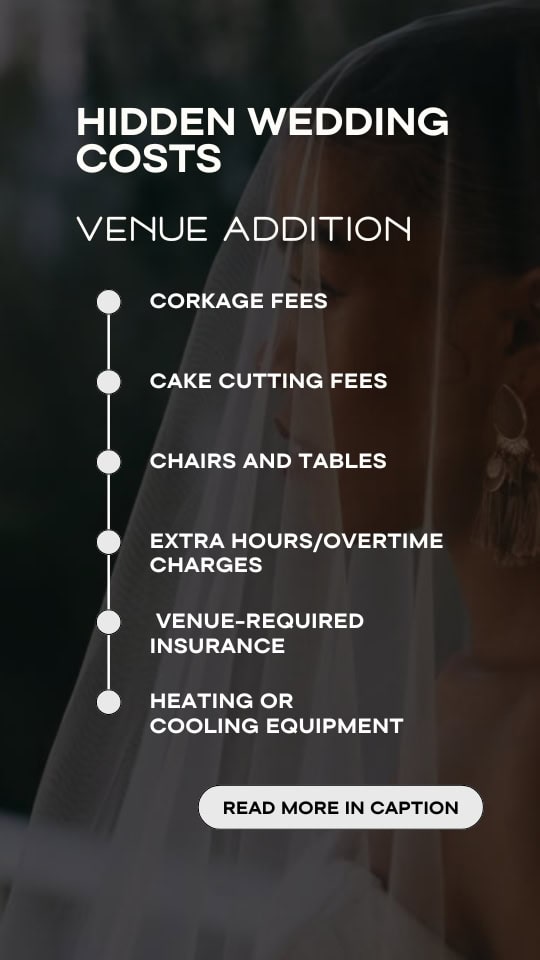
Venue hidden cost
18. Corkage fees
Bringing your own alcohol might seem like a money-saver, but many venues charge corkage fees per bottle, which can add up fast. If you’re supplying your own wine or spirits, make sure to factor this in. Some venues offer a corkage-free option if you meet a minimum beverage spend, so it’s worth checking.
19. Cake cutting fees
If you’re bringing in a cake from an outside bakery, some venues charge a per-slice fee to cut and serve it. This can be anywhere from $1 to $8 per guest, which adds an unexpected cost if you weren’t planning on it. Some couples opt for a smaller display cake and serve sheet cake from the kitchen to save money.
20. Set-up and breakdown fees
Not all venues include setup and teardown in their pricing. If your venue requires you to hire their staff for this, it can be an extra charge that isn’t always clearly advertised. Some venues charge an hourly rate for breakdown, so if you’re bringing in lots of décor or furniture, factor in extra costs.
21. Additional chairs and tables
Some venues provide a set number of tables and chairs, but if you need more for a large guest list or want upgraded options, you’ll need to rent them separately. This is especially common for outdoor weddings or venues that offer only basic seating. Renting stylish chairs or farm tables can look amazing but can be a hidden expense.
22. Extra hours/over-time charges
If your reception runs later than expected, many venues charge an overtime fee. DJs, photographers, and caterers may also have overtime policies that kick in after a certain number of hours. Even an extra 30 minutes can add unexpected costs, so it’s worth knowing your vendor contracts inside and out.
23. Venue-required insurance coverage
Some venues require couples to purchase event insurance, which protects against damages, accidents, or cancellations. This is especially common with historic properties, private estates, or public spaces like parks and beaches. Wedding insurance can be relatively inexpensive, but it’s an added cost that couples often forget.
24. Sound system and microphone rentals
If your venue doesn’t provide speakers or microphones for your ceremony and speeches, renting professional audio equipment is a must. A good sound system ensures that guests can actually hear your vows and speeches, but rental costs can range from $200 to $1,000 depending on what you need.
25. Heating or cooling equipment
Outdoor weddings are beautiful, but weather can be unpredictable. If you’re planning a winter or summer wedding, you may need to rent heaters, fans, or even a full tent with climate control. These rentals aren’t cheap, so always have a plan B in case of extreme temperatures.
Head to our hidden venue cost blog post for a deeper dive
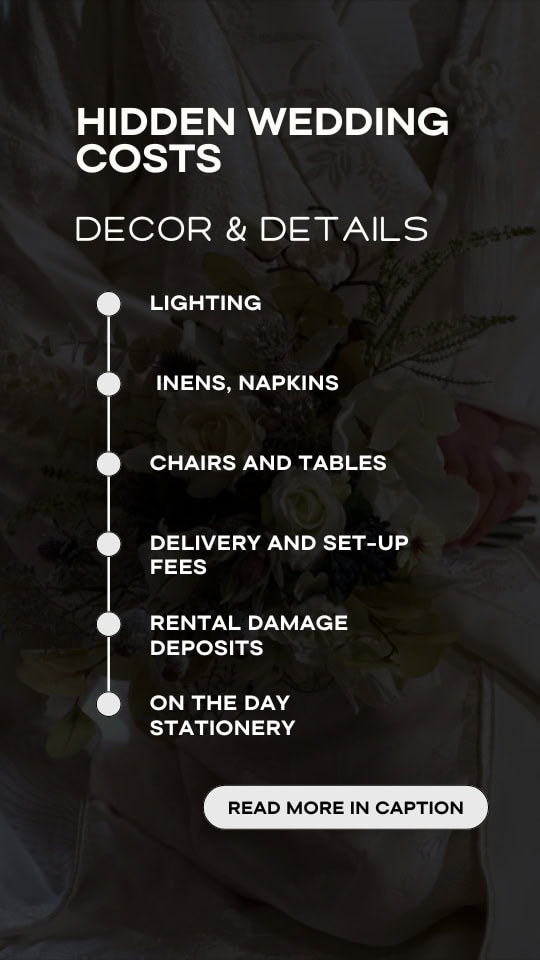
Decor & Details
26. Lighting
Many couples assume their venue’s lighting is enough, but if you want a specific ambiance—like twinkling fairy lights, lanterns, or custom uplighting—you’ll likely need to rent additional lighting, which can get pricey. Some venues also charge for adjusting or dimming their own lighting, so double-check what’s included.
27. Specialty linens, table runners, napkins
Standard tablecloths may be included, but if you want specialty fabrics, unique colors, or elegant runners, you may need to rent them separately. Costs can increase quickly, especially for large guest lists. A great way to save is to mix high-end linens on key tables (like the head table) and use standard ones elsewhere.
28. Tables and chair hire
If your venue doesn’t provide enough chairs or tables, you’ll have to rent them. Consider mix-and-match seating or alternative chair styles to cut costs while still achieving your aesthetic. Some couples use benches for ceremony seating, which can be more affordable than individual chairs.
29. Ceremony and reception signage
Welcome signs, seating charts, and directional signage are essential but often forgotten. To save, consider DIYing these or using digital signage if your venue allows. If you’re having multiple events, reusing signs by updating small details (like stickers or overlays) can help cut costs.
30. Delivery and set-up fees
Many rental companies charge separate fees for delivering and setting up items. Make sure to get a breakdown of costs before booking to avoid last-minute surprises. If you’re renting multiple items, try to source them from the same vendor to reduce multiple delivery charges.
31. Decor rental damage deposits
Renting decor is a great budget-friendly option, but many companies require security deposits. If anything gets damaged, that deposit may not be refundable, so factor this into your decor budget. Always check rental agreements to know what counts as “damage” and return items carefully to avoid extra fees.
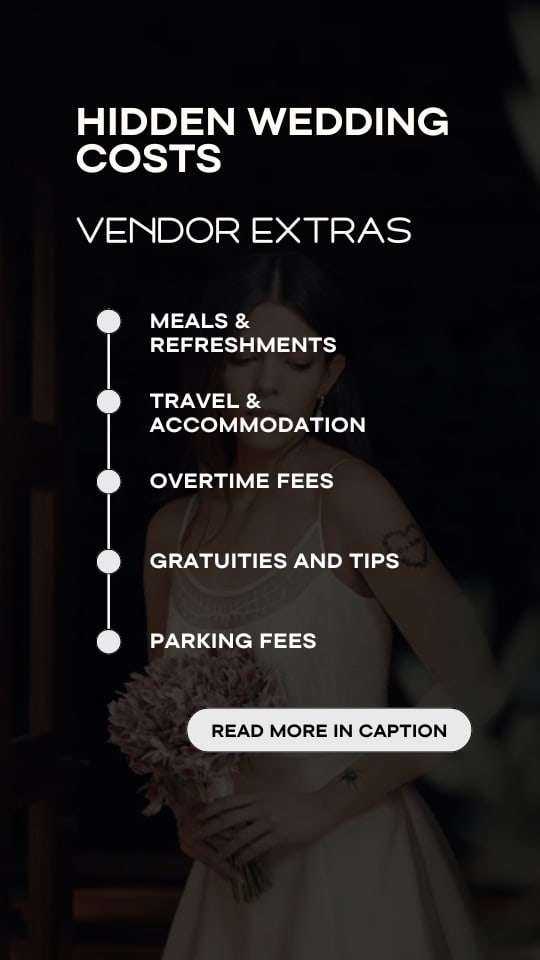
Vendor cost you may have not considered
32. Vendor meals and refreshments
Your photographer, videographer, planner, and entertainment team will be working long hours, and it’s common courtesy (and sometimes contractually required) to provide them with meals. Some caterers charge the same per-head price for vendors as they do for guests, so check your contract and budget accordingly. A good tip is to ask if your caterer offers discounted vendor meals, as some provide simpler, less expensive options for staff.
33. Vendor travel and accommodation costs
If you’re hiring a vendor from out of town, you may be responsible for their travel and hotel stay. Some vendors charge per-mile travel fees or require accommodations for overnight events. If you’re booking vendors from a different city, see if they have multiple bookings in your area on the same weekend to split travel costs with other couples.
34. Overtime fees
If your wedding runs late, vendors like photographers, DJs, and transportation services may charge by the hour for overtime. This can be hundreds of dollars per hour, so be mindful of your timeline. A good way to avoid this is to build in extra time from the start or have a backup plan if the schedule runs behind.
35. Gratuities and tips
While tipping isn’t always required, it’s often expected for many vendors, including hair and makeup artists, caterers, and entertainment. Factor gratuities into your final budget so you’re not scrambling on the day. Some contracts automatically include a service charge, so check before tipping extra.
36. Vendor parking fees
Some venues don’t provide parking for vendors, meaning you may need to cover valet fees or city parking costs for them. If your wedding is in a busy downtown area, parking costs can be steep, so it’s worth budgeting for or negotiating parking passes in advance.
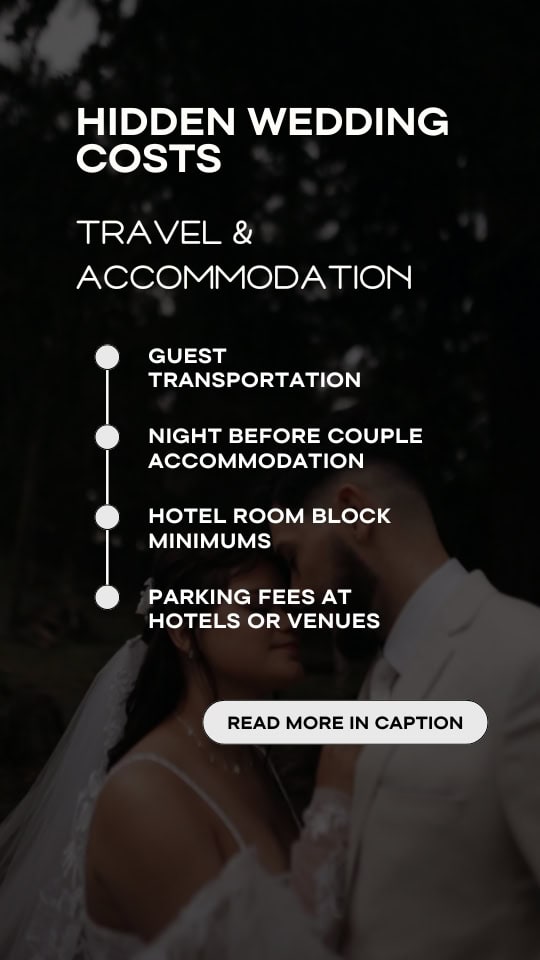
Travel & Accommodation
37. Guest transportation
Shuttles, Ubers, or valet services might be necessary depending on your venue’s location. If you want to provide transportation for guests, costs can add up quickly. To save, consider only providing transportation for out-of-town guests or booking a shuttle with multiple pick-up stops rather than private rides.
38. Couples’ accommodation for night before and night of wedding
Many couples forget to budget for their own overnight stay, whether it’s a luxury hotel suite or something simple. Booking early can save money, especially if your wedding falls on a peak travel weekend. Some hotels offer a complimentary night if you book a certain number of rooms for guests—always ask about this!
39. Hotel room block minimums and penalties
Blocking hotel rooms for guests often comes with minimum booking requirements. If your guests don’t fill the required number of rooms, you might have to cover the cost of the empty ones. To avoid this, negotiate a flexible room block with no penalties or a lower minimum requirement.
40. Parking fees at hotels or venues
Some venues and hotels charge guests for parking, which can add unexpected costs for those traveling in. If your venue doesn’t offer free parking, consider letting guests know in advance and providing alternative options like nearby public parking lots.
Extra Events
41. Engagement party costs
An engagement party is a fun way to celebrate, but it’s another event to budget for. Keeping it casual or hosting at home can help keep costs manageable. If you’re looking to save, consider combining it with another celebration like a birthday or holiday gathering.
42. Welcome party expenses
For destination or weekend weddings, many couples host a welcome party. Even a low-key gathering with drinks and appetizers can add to your overall budget. To keep it affordable, choose a casual venue with no rental fee or make it a bring-your-own-drink event.
43. Post-wedding brunch
Brunch the morning after the wedding is a lovely touch, but if you’re hosting, factor in food, venue rental, and service fees. Some hotels offer brunch discounts for wedding parties staying overnight, so be sure to ask.
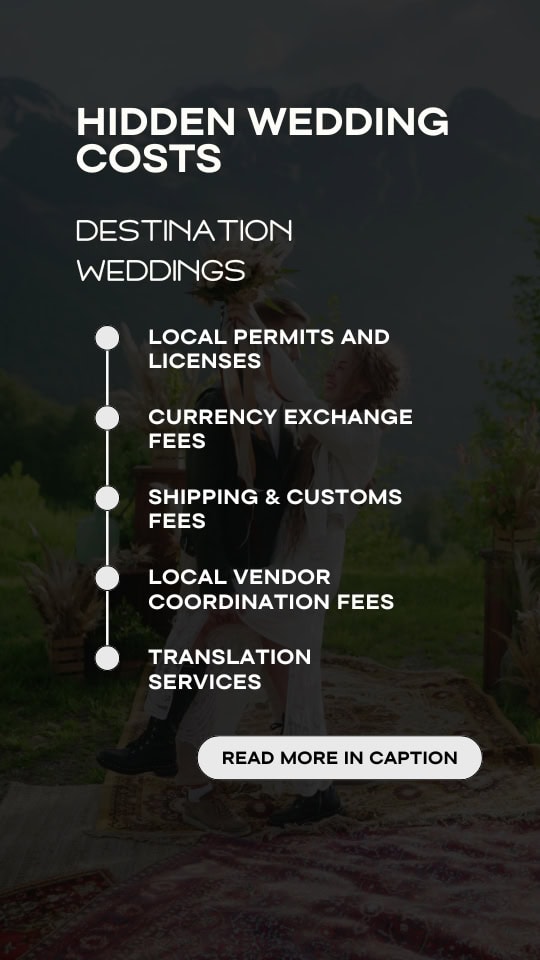
Destination Weddings
44. Local permits and licenses
Some destinations require special permits for beach or outdoor ceremonies. Research local regulations early to avoid last-minute fees. If your wedding is in a national park or historical site, extra permits may be needed for photography and setup.
45. Currency exchange fees
If you’re paying vendors in a different currency, fluctuating exchange rates and transaction fees can add up. Using a credit card with no foreign transaction fees can help reduce costs, or consider paying vendors in one lump sum to avoid multiple transaction fees.
46. International shipping and customs fees
Bringing decor, favors, or even your dress to another country? Customs fees and shipping costs can be steep, so check regulations before sending anything abroad. Some countries have strict restrictions on bringing in alcohol, florals, or DIY decorations, so research this ahead of time.
47. Local vendor coordination fees
If your venue requires you to use local vendors or a coordinator, you may need to budget for their services, even if you already have a wedding planner. Some resorts and venues charge coordination fees just to work with external vendors.
48. Translation services for documents or ceremonies
Getting married in a non-English-speaking country? You may need to pay for document translations or an interpreter for your ceremony. Some destinations require official translations for marriage certificates, which can add another unexpected fee.
Practical Tips for Avoiding Budget Surprises
- Expect the unexpected: Always set aside 5-10% of your total budget for surprise costs that pop up.
- Review every contract carefully: Vendors sometimes have hidden fees for things like setup, teardown, or specific service charges.
- Ask venues about extra fees upfront: Avoid surprise costs by asking about corkage fees, cake-cutting charges, and required insurance.
- Be flexible: If you can, consider alternatives like digital invitations, DIY decor, or renting rather than buying certain items.
Hidden wedding costs to add to your budget now
Planning a wedding is all about balance—making sure your dream day comes together while sticking to a budget that works for you.
Hidden costs can be frustrating, but with a little preparation, they don’t have to derail your plans.
By being proactive, asking the right questions, and leaving some wiggle room in your budget, you can avoid financial stress and focus on what really matters—celebrating your love with the people who mean the most to you!
More blogs you will love!
- Alternative Wedding Towers (Beyond Champagne)
- Wedding Snack Bar Ideas You’ll Wish You’d Thought Of First
- Unique Wedding Food Ideas for 2026 Weddings!
- Late-Night Wedding Snack Ideas That Actually Keep the Party Going
- 35 Trending Wedding Cake Ideas for 2026
- 30 Unique Wedding Ideas Trending in 2026
- Who Pays for What Now? Money Scripts for Modern Families
- Seating Plans When Your Family Isn’t “Traditional”
- 30 Unique Wedding Venues in Manchester for Modern Couples










